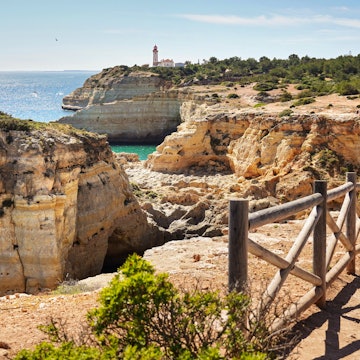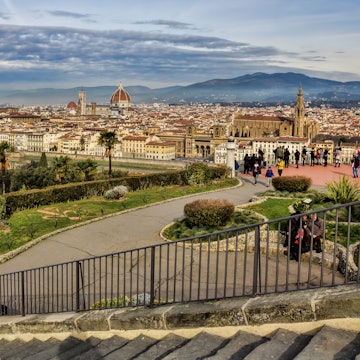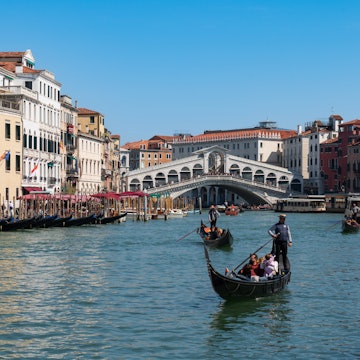
How do you save money on a trip to Europe in 2025? Ask a local

Apr 28, 2025 • 9 min read

Palermo, Sicily. Chiara Magi/Shutterstock
Want to experience the best of Europe without draining your savings? Knowing the tricks locals use to save money can help you budget more effectively when traveling.
Flexibility makes a difference too. Flying mid-week and opting for the “shoulder seasons” (May to June or September to October) can help you save on flights and avoid the peak crowds. Likewise, skipping third-party booking platforms and going directly to hotels can sometimes nab you a better deal, as can using a credit card without transaction fees. Once you’re on the ground, there are plenty of small adjustments you can make to offset those rising costs without feeling like you’re pinching pennies every step of the way.
Here's what our local writers in France, Italy, Spain, Greece, Ireland, Denmark and Portugal do to stretch their euros, and the tips and tricks you can borrow to save money too.


Denmark
Laura Hall is a travel writer and journalist based in Copenhagen, Denmark
Book train tickets in advance: If you plan to travel by train, book on DSB, the national rail website, and look out for the limited, heavily discounted Orange tickets that offer reduced prices outside of rush hour. The tickets get released two months ahead of travel, so be sure to book in advance to score them.
Visit free museums in Copenhagen: There are a handful of museums in Copenhagen that are free to visit. The David Collection – with a collection including Islamic art, European 18th-century art and Danish early modern art – is one of them.
Explore waterways for free: For a fun way to explore Denmark's cities from the water, book ahead and grab a Green Kayak for free. All you have to do is gather some litter while you explore. The kayaks are available in locations including Copenhagen, Aalborg, Aarhus and Odense.
Enjoy free harbor swimming: Denmark's open-air floating harbor swimming pools are free and in use all year round. Just pack a swimsuit and a towel. They're a great place to meet local people and make friends. You'll find floating saunas you can rent by the hour in every Danish city, too.
Eat cheaply with a local favorite: Ask for a boller med ost, a cheese roll. Every bakery serves them, though they might not be visible on the menu, and there's even a healthy competition between bakeries about which serves the best version. A fun Instagram account seeks out the best and rates them.
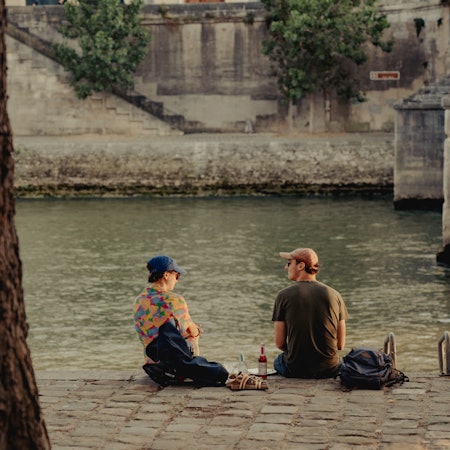

France
Julien Marsault is a reporter, writer and photographer from Rennes, France
Grab quick bites at a local bakery: When it comes to cost and quality, you can rarely go wrong with a quick bite in a local bakery or boulangerie. The selection is vast, and the service is usually speedy. Expect to pay around €4–5 (US$4.50–5.70) for a jambon-beurre (ham and butter baguette) and a croissant. Focus on independent shops, which are generally of higher quality.
Use a carpooling service: Nowadays, many French people use carpooling services, like BlaBlaCar, to get around and save on fuel expenses. As a traveler, it's also an excellent option to meet people and get recommendations for your journey.
Enjoy a bottle of wine in a park instead of a bar: Drinking alcohol in public spaces is not prohibited in France. As the warmer days approach, it's a pleasant experience to have an outdoor apéro. Except to pay €5–10 (US$5.70–11.35) for a decent bottle of wine in a local caviste or wine merchant.
Take advantage of free cultural events: Throughout the year, all across France, free events take place to promote culture and local heritage. For example La Fête de la Musique is held every June 21, which hosts free concerts and events all over the country, and La Nuit des Musées in May offers free nighttime visits to museums.
Purchase seasonal products based on their location: Whether you're interested in getting vegetables, fruits or seafood, take the time to learn about their origins and production season. For instance, spider crabs have become a worrisome invasive species in Brittany, making them relatively inexpensive to purchase and a delicious local specialty.


Greece
Sarah Souli is a freelance travel journalist living in Athens, Greece
Skip dessert in northern Greece: Restaurants here will almost always serve you a free sweet treat at the end of your meal – anything from sliced fruit to lemon curd to kormos (a traditional cake made of biscuits and chocolate).
Visit tsipuradika bars for free snacks: When ordering tsipuro (a triple-distilled liquor), a shot automatically comes with a small plate of savory snacks. Order enough, and you'll have basically eaten a full meal.
Find unorganized beaches: You only have to pay for a beach chair and umbrella if you're visiting an "organized" beach, that is, a beach with amenities. Be on the lookout for unorganized beaches where you can lay your towel down without spending a dime.
Ask for pharmacy discounts: Most pharmacies do promotions on beauty products but don't necessarily advertise them. Be sure to ask the pharmacist for discounted items, especially on local luxury skincare and beauty brands like Korres and Apivita, which can be up to 30% less in Greece.
Sign up for ferry loyalty cards: If you're island-hopping or taking a lot of ferries around Greece, register for loyalty programs with companies like BlueStar Ferries and SeaJets to earn discounts on trips and reward points.


Ireland
Sasha Brady is a Lonely Planet editor from Dublin, Ireland
Use public transport smartly: If you're in Dublin, purchase a Leap Visitor Card for unlimited travel on the bus, Luas (tram) and DART (city train). The 72-hour card costs just €16 (US$18.15) and is perfect for weekend visits, no deposit required.
Visit free cultural attractions: Explore Ireland's impressive collection of free museums and galleries, including all National Museums, Cork Public Museum, Galway City Museum, Chester Beatty Library, and the Irish Museum of Modern Art. Heritage sites throughout the country can also be visited for free on the first Wednesday of every month.
Take affordable an day trip from Dublin: Ride the DART to the seaside village of Howth (€5.20/US$5.90 return) and hike the Howth Cliff Walk (free), enjoy some street eats from the farmers market on Saturday or fish and chips from Beshoff Bros (from €15.65/US$17.75) by the harbor before stopping in the Abbey Tavern, a 16th-century pub for live music (free) and a coffee beside the roaring fire.
Explore beyond the capital: Get out of Dublin altogether – you'll find that prices in other parts of the country for everything from food to drink and accommodation are slightly cheaper than in the capital. Also, the scenery is better.
Use dining discount apps: Download Early Table, a restaurant app offering between 25% and 50% off food bills for dining during off-peak times, helping restaurants fill tables when they're quiet.
Seek out affordable entertainment: Ireland has a thriving live music, theater and comedy scene with many affordable smaller productions. Check out Nialler9 for music gig listings in Dublin, Limerick and Cork and Alternative Dublin for comprehensive event guides.


Italy
Benedetta Geddo is a journalist and content creator from Turin, Italy
Discover free beaches: Almost half of Italy's coastline is privatized with rental fees reaching up to €160 (US$180) per day in some upmarket areas like the Italian Riviera. However, free public beaches are still available. Inquire at your hotel or Airbnb. Italians often have favorite spots that may not be widely known but offer a more authentic experience.
Walk everywhere possible: Italians walk everywhere, especially in cities like Venice and Florence, and rarely use Uber and taxis unless in a rush. It's not just about saving money on transportation; it's about immersing yourself in the lifestyle and experiencing the city on foot. Many cities in Italy are compact and pedestrian-friendly.
Avoid driving in historic centers: Before renting a car, familiarize yourself with the limited traffic zones (Zona a Traffico Limitato or ZTL) to avoid potential fines. These restricted areas are common in tourist areas such as the centro storico (a city or town's historic center), where parking is prohibited most of the day. Park further away from crowded tourist hubs and use public transportation wherever possible.
Get coffee and bathroom access together: Most public toilets require payment, so most Italians buy coffee at a nearby cafe. By doing so, you can then use the bathroom without incurring an additional fee –you essentially still have to pay, but at least you get a coffee in return for your visit.
Stand while drinking coffee: You'll pay more for one if you sit at a table in a cafe, particularly in touristy locations or outdoor seating areas. This is why many Italians often stand at the bar while enjoying their espressos. By standing at the bar, you are typically charged a lower price for your coffee than sitting at a table.


Portugal
Joana Taborda is a travel writer and editor from Lisbon, Portugal
Order menu do dia (menu of the day) at lunch: Most restaurants in Portugal will offer a fixed menu deal or a daily dish (prato do dia) for a little under €10 (US$11.30) during lunchtime.
Say no to starters: While it's tempting to start tucking into that bread and olives spread the waiter casually dropped on your table, it's usually not free. You can politely decline it and avoid that extra fee on your bill.
Buy a transport card: Save money on public transport, including those quaint funiculars and trams, by getting a prepaid card like Navegante (in Lisbon) or Andante (Porto). For long-distance travel, such as buses and trains, book tickets up to one week in advance to get up to 50% discount.
Visit museums for free on Sundays: Many local museums offer free admission on Sundays, such as the Museu Calouste Gulbenkian. Alternatively, you can time your visit around International Museum Day on Sunday May 18.
Get drinks on the go: Skip those pricey cocktails at the bar and head to the supermarket to stock up on an affordable bottle of wine. Then, hit the nearest viewpoint for the ultimate sunset ritual with the locals.
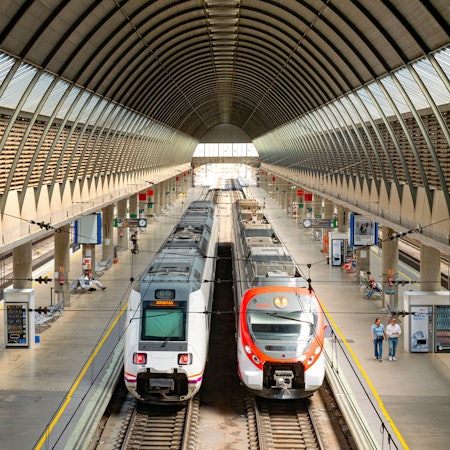

Spain
Natalia Diaz is a guidebook author and journalist who lives in Madrid, Spain
Order the menú del día (menu of the day) for lunch: On weekdays, most restaurants offer a fixed-price daily lunch menu (€8 to €17) that includes a filling three-course meal, dessert, drinks, bread and coffee.
Buy marca blanca (white mark) products in supermarkets: These products are manufactured by a third-party producer and sold under the brand name of a supermarket or retail chain instead of a well-known brand. They are commonly available for food, household and personal care products, are more affordable and of decent quality.
Take early high-speed trains: The Renfe AVLO high-velocity "early bird" trains offer up to 70% savings on long-distance train fares. It departs Madrid at 6:30am and connects you to several main Spanish cities, including Barcelona, Málaga, Sevilla, and Valencia, starting at just €7 (US$7.95).
Eat inside restaurants instead of on a terraza (outdoor terrace): While it's tempting to dine al fresco, especially during perfect weather in sun-drenched Spain, many establishments charge extra for an outdoor table. Save a few euros by eating indoors.
Think twice about "free bread": If the server asks if you want bread, it's always good to ask if you'll be charged for it.









